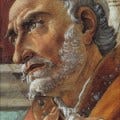St. Augustine’s Confessions & More


No man can be a good metropolitan if he loves his title but not his task
“Like a colossus bestriding two worlds, Augustine stands as the last patristic and the first medieval father of Western Christianity. He gathered together and conserved all the main motifs of Latin Christianity from Tertullian to Ambrose; he appropriated the heritage of Nicene orthodoxy; he was a Chalcedonian before Chalcedon–and he drew all this into an unsystematic synthesis which is still our best mirror of the heart and mind of the Christian community in the Roman Empire. More than this, he freely received and deliberately reconsecrated the religious philosophy of the Greco-Roman world to a new apologetic use in maintaining the intelligibility of the Christian proclamation. Yet, even in his role as summator of tradition, he was no mere eclectic. The center of his “system” is in the Holy Scriptures, as they ordered and moved his heart and mind. It was in Scripture that, first and last, Augustine found the focus of his religious authority.”
–From the Introduction by Albert C. Outler
AUGUSTINE’S TESTIMONY CONCERNING
THE CONFESSIONS
I. The Retractations, II, 6 (A.D. 427)
1. My Confessions, in thirteen books, praise the righteous and good God as they speak either of my evil or good, and they are meant to excite men’s minds and affections toward him. At least as far as I am concerned, this is what they did for me when they were being written and they still do this when read. What some people think of them is their own affair [ipse viderint]; but I do know that they have given pleasure to many of my brethren and still do so. The first through the tenth books were written about myself; the other three about Holy Scripture, from what is written there, In the beginning God created the heaven and the earth,even as far as the reference to the Sabbath rest.
BOOK ONE
CHAPTER I
1. “Great art thou, O Lord, and greatly to be praised; great is thy power, and infinite is thy wisdom.” And man desires to praise thee, for he is a part of thy creation; he bears his mortality about with him and carries the evidence of his sin and the proof that thou dost resist the proud. Still he desires to praise thee, this man who is only a small part of thy creation. Thou hast prompted him, that he should delight to praise thee, for thou hast made us for thyself and restless is our heart until it comes to rest in thee. Grant me, O Lord, to know and understand whether first to invoke thee or to praise thee; whether first to know thee or call upon thee. But who can invoke thee, knowing thee not? For he who knows thee not may invoke thee as another than thou art. It may be that we should invoke thee in order that we may come to know thee. But “how shall they call on him in whom they have not believed? Or how shall they believe without a preacher?” Now, “they shall praise the Lord who seek him,” for “those who seek shall find him,” and, finding him, shall praise him. I will seek thee, O Lord, and call upon thee. I call upon thee, O Lord, in my faith which thou hast given me, which thou hast inspired in me through the humanity of thy Son, and through the ministry of thy preacher.
…..
This work is a must read. As Augustine plumbs the depths of his humanity and finds sin, he also mines the Word of God and finds grace, forgiveness, and power unto holy living. If you want to begin your journey through Augustine’s confessions, here are some resources to help get you started:
The book online at CCEL: http://www.ccel.org/a/augustine/confessions/confessions.html
The hard copy on Amazon: http://www.amazon.com/Confessions-Oxford-Worlds-Classics-Augustine/dp/0199537828
The Kindle version: http://www.amazon.com/Confessions-Oxford-Worlds-Classics-ebook/dp/B00AAW5EDG/ref=tmm_kin_swatch_0?_encoding=UTF8&sr=&qid=
…..
If you’ve already read read Confessions, it is time to move forward in your studies of St. Augustine. His Commentary on the Psalms contains his “Theology of Wonder”describing the humanities in such a way that later men were able to define the 7 liberal arts.
This book online at CCEL: http://www.ccel.org/ccel/schaff/npnf108.toc.html
The hard copy on Amazon: http://www.amazon.com/Expositions-Psalms-Works-Saint-Augustine/dp/1565481402/ref=sr_1_11?s=books&ie=UTF8&qid=1395402056&sr=1-11&keywords=Augustine+Psalm+Commentary
The Kindle version: http://www.amazon.com/Expositions-Psalms-Augustine-Hippo-ebook/dp/B008T4N2J0/ref=sr_1_3?s=digital-text&ie=UTF8&qid=1395401770&sr=1-3&keywords=Augustine+Psalm+Commentary
A lecture by Dr. George Grant at Wordmp3.com: http://www.wordmp3.com/details.aspx?id=4725
There’s a little to get you started. Enjoy!<>привлечь посетителя на
The post St. Augustine’s Confessions & More appeared first on Kuyperian Commentary.

